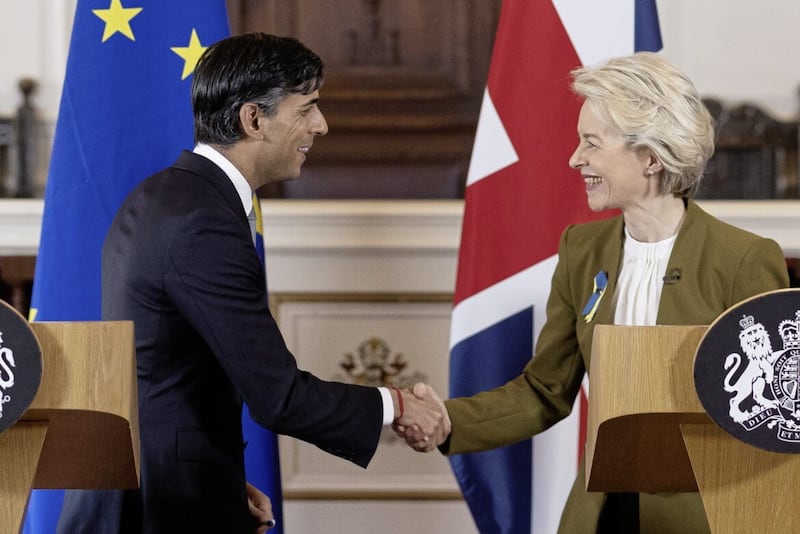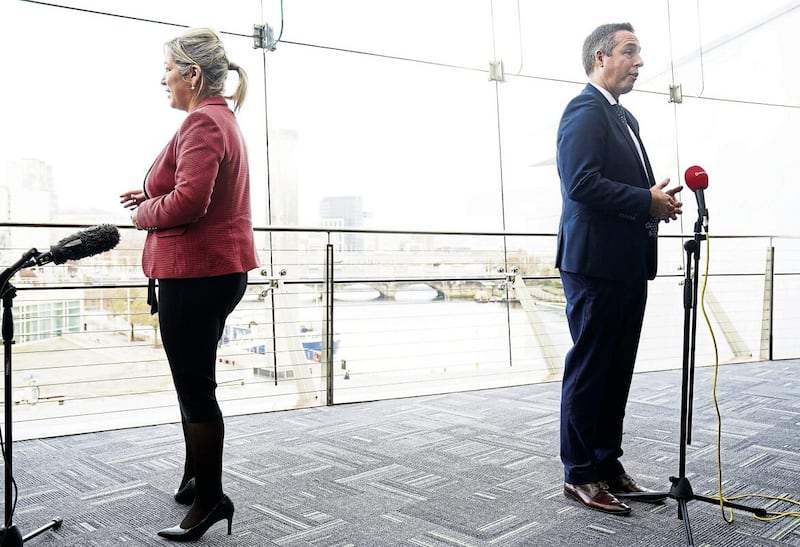At the beginning of 2023 I made a resolution. Rather than my usual relentless negativity about political progress, I would look for even the smallest hints of optimism and escape routes which might, just might, suggest political breakthrough and cooperation were possible.
My resolution surprised readers and pundits alike. A colleague in the BBC told me that my new-found optimism was like a “disturbance in the force… unsettling, in fact”. A number of others said that sitting in a studio and listening to me arguing in favour of common sense prevailing in 2023 was, in the words of one, “a very surreal experience… a bit like watching a conversion live before your very eyes”.
No matter how convoluted and cantankerous the process became – particularly after the Windsor Framework was hustled through Westminster with barely the whiff of a rebellion on the Tory backbenches – I trotted out a variation of the same commentary: a deal is coming, because there is nowhere else to go.

So, what are my feelings now, 72 hours before 2024 crosses the threshold?
Two come to mind immediately: optimism is a waste of time and energy when it comes to Northern Ireland politics; and I’m not sure I actually care any more about what happens to the assembly.
Crucially, though, my old friend pessimism has been unshackled and returned to his usual spot at the front of my mind. And boy, do I feel better!

I’m not going to have to continue with the absurd, mentally debilitating pretence that all that’s required is goodwill blended with a miracle in order for us to have a form of governance which wouldn’t stand comparison with the annual farce at the Grand Opera House.
Indeed, I’m sure I could make a fairly convincing argument that Widow Twankey and Baron Hardup as first and deputy first minister, accompanied by a random selection of pantomime regulars, could, when it comes down to it, run the place on a sounder basis than previous efforts. Sadly, though, the line between real life and fantasy is too often blurred here.
Northern Ireland is a fairly small place. Small enough to be run reasonably easily by a 90-strong assembly with a power-sharing executive. The priority issues – health, education, the economy, rural matters and budgeting, to name a few – – are, in the language of the younger generation, ‘in your face.’ You don’t need binoculars or a telescope to spot what needs to be taken in hand and addressed with a costed, thought-through, collectively-agreed strategy.
Illness and disability don’t discriminate between Protestant, Catholic or Other. An executive minister’s position on the constitutional question doesn’t have an impact on the requirement for good education for all children between four and 18; or the need for better infrastructure; or attracting good jobs and investment; or better housing; or safe water; or almost anything else that an executive and assembly must do to underpin solid, consensual government. You don’t need a degree in economics or accountancy to measure the difference between underspend and overspend.
I’m sure I could make a fairly convincing argument that Widow Twankey and Baron Hardup as first and deputy first minister, accompanied by a random selection of pantomime regulars, could, when it comes down to it, run the place on a sounder basis than previous efforts
So, what’s the key destructor at the heart of our governance problem? Or, paraphrasing Clarence, the angel from It’s A Wonderful Life, “what would Northern Ireland look like if the assembly had never existed”?
Go on, sit down for 10 minutes and think about the answer to that question. If you voted Yes in 1998 what were you hoping for? If you voted No, what were you hoping for? If you voted No in 1998 and then backed the DUP/SF deal in 2007, what were you hoping for? If you’ve ever been an MLA or executive minister, what were your hopes for Northern Ireland?
I don’t know what your answers are, or if there’s some sort of overall consensus which could provide a platform for genuine hope. All I know is that we need something that works. And we need it now.
On that almost optimistic note, happy new year.



